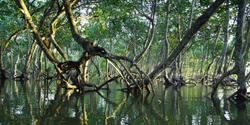Natural solutions: seawalls are not the only climate buffer
Event description
Explore the critical role of nature-based solutions in protecting communities from climate-driven disasters, with experts from Australia, the Philippines, and Fiji sharing insights on integrating justice and biodiversity into climate adaptation.
As climate disasters increase in severity and frequency, nations must adapt to protect citizens and assets, but is building more infrastructure the solution? Hear from experts as they explore the potential of nature-based solutions, like wetlands and mangroves, in acting as climate buffer infrastructure. They will share new findings from SEI’s project Examining climate buffer projects in the Philippines, that address how justice and biodiversity issues can be addressed alongside climate adaptation solutions.
This event is in partnership with the Marine Studies Institute and the third panel in SEI's four-part Climate and Biodiversity Crises Series. The public panel series brings together those working on climate solutions and nature damage to consider how these two crises can be addressed together.
Speakers:
Justin See (Chair), climate change adaptation researcher
Justin See (Chair) is a Postdoctoral Research Associate in Climate Change Adaptation at the Sydney Environment Institute. He helps in the development and management of research projects relevant to climate change adaptation for SEI’s Climate disaster and adaptation theme and leads the research project Examining climate buffer projects in the Philippines. Justin has more than 10 years of research experience in the field of climate change adaptation, vulnerability, and climate justice. Utilising strengths-based, gender sensitive and place-based approaches, his research explores the complex social, political, and economic injustices brought about by various responses to climate change and highlights diverse pathways to climate adaptation. He has published his work in climate change journals such as Global Environmental Change, Climatic Change, Climate and Development, and Journal of Flood Risk Management.
Jazmin (Minet) Aguisanda-Jerusalem, Filipino disaster risk reduction expert
Jazmin (Minet) Aguisanda-Jerusalem is the Executive Director of the Leyte Centre for Development and manages programs that have continued to help poor and vulnerable communities become more resilient. Minet has over 40 years of experience working in disaster risk reduction at various NGOs and has helped more than 300,000 families in the Eastern Visayas region of the Philippines. Most notably, she led the planting of a 7-hectare mangrove forest that saved over 700 homes and 4,300 people from being swept away by huge sea surges caused by Typhoon Odette. The mangrove project provided capacity building opportunities for local youth, women and farmers and provided eight communities with early warning systems and motorboats for monitoring the Marine Protected Area.
Suliasi Vunibola, researcher on Indigenous community resilience in the Pacific
Suliasi Vunibola is a Climate Crisis Research Fellow at the University of Canterbury. His research looks at Indigenous knowledge systems, community Indigenous innovation, alternative development, community driven development and social transformation in the Pacific. Currently his research focusses on climate-resilient development adaptation and mitigation measures, including Indigenous and local knowledge and system transitions, to reduce risks from the human-induced climate crisis in the Pacific. He also works on community self-determination projects with Indigenous communities across the Pacific, carbon colonialism, cognitive justice, regenerative sustainability, politics within neoliberalisation of development aid, food security and food sovereignty for Māori as indigenous peoples of Aotearoa, New Zealand and Pacific diaspora communities.

Tickets for good, not greed Humanitix dedicates 100% of profits from booking fees to charity

